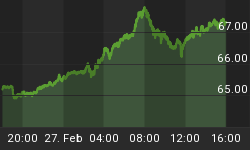Global capital is looking for a place to hide. But after decades of enthusiastic currency creation and financial engineering, there's way too much of it for any one country to accommodate. This mismatch between money knocking at the door and available space is leading the handful of remaining safe havens to put up "no vacancy" signs in order to avoid being swamped. Among the things they're trying is negative interest rates. That is, if you want to deposit money in a Swiss or Danish bank or lend money to the Japanese or German governments you now have to pay them for the privilege.
This sounds a little crazy, and from a historical perspective it is indeed highly unusual. But it's exactly what you'd expect in a world of ever-increasing debt and ever-more-exotic financial speculation: Too much bad paper gets created which eventually blows up, causes instability and leads worried investors to value return of capital over return on capital. They all pile into whatever seems most likely to still exist a decade hence, forcing (or enabling) the managers of those assets to charge rather than pay interest. Here's a sampling of recent stories on the subject:
Less Than Zero: When Interest Rates Go Negative
In Denmark, Depositors to Pay Interest to Bank
Negative interest rates are hammering Germany's savings banks
Riksbank Preview: Next in Line for Negative Interest Rates?
Swiss Impose Negative Rate Echoing 1970s Amid Russia Crisis
Get Ready For Negative Interest Rates In The US
Now, there are lots of interesting sub-topics to explore in a world of negative interest rates. But let's start with the role of gold. Traditionally the ultimate safe haven, it is the one form of money that can't be messed with and therefore the place to be when the messing gets out of hand.
Lately, for instance, it has spiked in countries with emerging currency crises. In Russia, Argentina, Greece and in fact the entire eurozone, the local-currency price of gold has risen faster even than the exchange rate of safe haven currencies like the US dollar and Swiss franc. And with interest rates going negative in much of the world, a person with capital to allocate confronts a new and very interesting risk/return calculus. Consider:
On a cash flow basis, gold sitting in a vault actually costs money in the form of storage fees. In normal times -- back when government bonds and bank deposits yielded, say, 6% -- the spread in favor of the bond and against gold was pretty compelling. But what happens when interest rates go negative, so that the cash cost of owing gold and government bonds is pretty much the same at around 1% a year? Now our hypothetical capital allocator has to ask some new questions. Among them: Has a fiat currency ever had a sustained period of rising value? That is, has there ever been deflation for more than just a short while in a system where a central bank could create unlimited amounts of currency? The answer is no, for an obvious reason: Deflation is bad for sitting politicians because it makes both government and business debts harder to manage and therefore elections harder to win.
In such circumstances money printing is pain-free. The sound-money advocates who normally criticize debt monetization are silenced by falling prices. Inflationists, meanwhile, love easy money and can always be counted on to cheer low interest rates and currency devaluation. So when fiat currency deflation becomes a possibility, it is always and everywhere met with a tidal wave of newly-created money, which eventually converts deflation into inflation.
This has been happening on a rolling basis around the world. When one country or currency bloc slows down its central bank opens the monetary spigot, interest rates plunge and the currency falls against its peers.
So here we are, with gold and government bonds costing about the same to own, but governments actively trying to lower the value of their bonds and bank accounts while gold is rising wherever trouble erupts.
The logical conclusion is that if gold and cash both cost the same to own, then maybe gold -- which has held its value over millennia while every previous fiat currency has evaporated -- is the better bet. In Switzerland, this is apparently already happening:
Swiss Bank Says Investors Favor Gold Amid Charges on Cash
(Bloomberg) -- Investors are buying more gold as an alternative to hold Swiss franc cash deposits, according Vontobel Holding AG, a Swiss bank and wealth manager."We keep noticing that gold is coming back into favor with investors," Vontobel Chief Executive Officer Zeno Staub, 45, told reporters Wednesday after the Zurich-based company announced full-year earnings.
Concerns that Greece may abandon the euro and Ukraine may be headed for a wider conflict have spurred demand for haven assets. Gold has climbed 4.2 percent this year, even as the dollar strengthened on prospects of higher U.S. interest rates. Investors' holdings in gold-backed funds are near the highest since October.
Vontobel boosted the proportion of gold in discretionary managed investments by 2 percent after the Swiss National Bank increased charges on banks that use it as a custodian for franc deposits, Staub said. The central bank introduced a 0.75 percent negative interest rate on some deposits as of Jan. 22.















